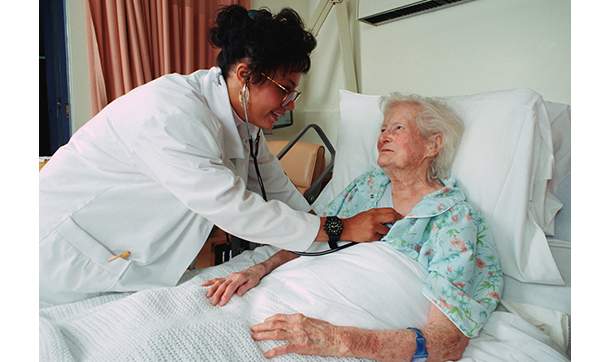 The Interstitial Lung Disease (ILD) Program at the University of Arizona College of Medicine – Tucson has been selected as a member of the Pulmonary Fibrosis Foundation (PFF) Care Center Network.
The Interstitial Lung Disease (ILD) Program at the University of Arizona College of Medicine – Tucson has been selected as a member of the Pulmonary Fibrosis Foundation (PFF) Care Center Network.
As part of the PFF Care Center Network, the Interstitial Lung Disease Program will have access to a wealth of resources for both patients and caregivers and will collaborate with 20 other academic institutions across the nation to advance the care of patients with pulmonary fibrosis (PF).
![Dr. Gordon Carr [Dr. Gordon Carr]](https://deptmedicine.arizona.edu/sites/default/files/carrteaser_0_0.jpg) “We are honored that the Pulmonary Fibrosis Foundation has recognized the quality of our programs and the expertise our physicians have in diagnosing and treating patients with fibrotic lung disease,” said Gordon Carr, MD, director of the UA ILD Program and assistant professor of medicine in the Division of Pulmonary, Allergy, Critical Care and Sleep Medicine, Department of Medicine, UA College of Medicine – Tucson. Dr. Carr also is medical director of the Medical Intensive Care Unit at the University of Arizona Medical Center (UAMC), soon to be Banner – University Medical Center following closing of the merger of the hospital’s parent company, the University of Arizona Health Network, with Banner Health later this month.
“We are honored that the Pulmonary Fibrosis Foundation has recognized the quality of our programs and the expertise our physicians have in diagnosing and treating patients with fibrotic lung disease,” said Gordon Carr, MD, director of the UA ILD Program and assistant professor of medicine in the Division of Pulmonary, Allergy, Critical Care and Sleep Medicine, Department of Medicine, UA College of Medicine – Tucson. Dr. Carr also is medical director of the Medical Intensive Care Unit at the University of Arizona Medical Center (UAMC), soon to be Banner – University Medical Center following closing of the merger of the hospital’s parent company, the University of Arizona Health Network, with Banner Health later this month.
PF is a condition in which lung tissue becomes thickened, stiff and scarred over time, eventually causing the lungs to lose their ability to transfer oxygen into the bloodstream. As a result, the brain and other organs don’t receive enough oxygen. The cause of the fibrosis can be determined in some patients but in many there is no known cause. When the cause is unknown—and certain pathologic or radiographic criteria are met—the disease is called idiopathic pulmonary fibrosis, or IPF.
In addition to IPF, there are many other forms of PF and ILD, noted Dr. Carr. These disorders cause cough, shortness of breath, decreased quality of life and possibly respiratory failure. Common causes include smoking, inhaling occupational pollutants such as asbestos, silica or coal dust, autoimmune diseases like rheumatoid arthritis or exposure to certain medications, toxins or other substances.
“Accurate diagnosis of ILD and PF requires a multidisciplinary approach. The UA ILD Program was created to provide patients with a comprehensive evaluation and treatment plan, based on input from specialists in lung diseases, autoimmune disease, radiology, pathology and other specialties,” said Dr. Carr.
UA ILD Program research is applied in a clinical setting at the UAMC - University Campus, 1501 N. Campbell Ave., Tucson. Clinic physicians maintain special interest and expertise in interstitial and immunologic disorders of the lung. Patients with these complicated diseases are diagnosed and treated by pulmonologists Dr. Carr; Ken Knox, MD, chief of the Division of Pulmonary, Adult Allergy, Critical Care and Sleep Medicine and UA associate professor of medicine and immunobiology; and Ashleigh Rodriguez, NP, adjunct instructor, UA College of Nursing, who work with other specialists, including specially trained rheumatologists, radiologists and pathologists. The UA ILD Program also offers education, novel treatments, when available, and research studies for eligible patients.
To make an appointment with any of these providers, please call 520-694-8888. Learn more at uahealth.com
--------------------------------------------------------
About the Pulmonary Fibrosis Foundation Care Center Network
Founded by the Pulmonary Fibrosis Foundation in 2013, PFF Care Center Network sites use a multidisciplinary approach to deliver comprehensive patient care, forming specialized care teams comprised of experts in interstitial lung disease in pulmonary medicine, rheumatology, radiology and pathology. This multidisciplinary approach is critical to managing a complex disease like PF and ensuring people with PF receive an accurate diagnosis, obtain quality clinical care and acquire important support services. The Care Center Network was expanded in January 2015, bringing the total number of academic medical centers to 21 in 20 states. Learn more at pulmonaryfibrosis.org
Media Contact: Jean Spinelli

